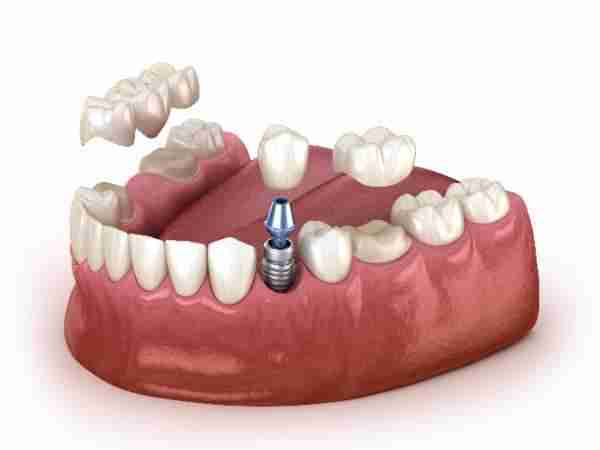Dental implants have revolutionised modern dentistry, offering a long-lasting and natural-looking solution for missing teeth. Whether you’ve recently had an implant or are considering one, knowing how to care for it properly is essential for ensuring its success and longevity. We stress the importance of proactive dental care and regular check-ups to prevent complications, support healing, and maintain oral health. With the right guidance, implants can function just like natural teeth, providing comfort, stability, and confidence in your smile. Understanding best practices for cleaning, nutrition, and routine maintenance ensures your dental implant remains a reliable part of your oral health for years to come.
Understanding Dental Implants
Dental implants are titanium posts surgically placed into the jawbone, acting as artificial tooth roots. They provide a strong foundation for crowns, bridges, or dentures. One of their key benefits is preserving bone structure, preventing the sunken appearance that can occur with missing teeth.
Dental Implant Glasgow specialists often recommend implants due to their durability, comfort, and natural appearance. However, success depends heavily on meticulous oral hygiene and routine professional care.
Initial Recovery After Surgery
After implant surgery, the healing process is crucial. Swelling, minor bruising, and discomfort are normal in the first few days. During this period:
- Stick to soft foods to avoid straining the implant site.
- Avoid smoking or alcohol, which can slow healing.
- Maintain gentle oral hygiene, using a soft-bristled toothbrush to clean surrounding teeth.
If you experience severe pain, unusual swelling, or signs of infection, promptly contacting an emergency dentist in Glasgow is vital. Early intervention can prevent complications and safeguard the implant’s success.

Daily Oral Hygiene for Implants
Maintaining dental implants requires more than just routine brushing. To ensure their long-term success, it is essential to follow a comprehensive oral hygiene routine. Brush at least twice daily using a soft-bristled toothbrush and non-abrasive toothpaste, making sure to gently clean all surfaces of your teeth and around the implant. Flossing with implant-friendly tools, such as specialised floss or interdental brushes, helps remove plaque and debris from hard-to-reach areas.
Additionally, using an antibacterial mouthwash can reduce harmful bacteria, protect your gums, and prevent inflammation. Consistently following these steps not only safeguards your natural teeth but also supports the integration of the implant with the jawbone, promoting a healthy and lasting smile.
Nutritional Considerations
A nutrient-rich diet supports both healing and the long-term maintenance of dental implants. Focus on:
- Calcium-rich foods like milk, cheese, and yoghurt to strengthen bones.
- Protein sources such as eggs, lean meats, and legumes for tissue repair.
- Vitamin C from fruits and vegetables to support gum health.
Avoid excessive sugar and acidic foods, which can compromise both natural teeth and implant stability.
Key Home Care Tools
- Soft-bristled toothbrushes
- Interdental brushes or implant floss
- Antibacterial mouthwash
- Travel dental kit for frequent travellers
Professional Cleaning and Check-Ups
Even with impeccable home care, professional dental check-ups are essential to maintain the health and longevity of your implants. Dentists can remove hard-to-reach plaque and tartar that brushing and flossing may miss, reducing the risk of gum disease and peri-implantitis. They also carefully examine the implant, surrounding gums, and bone structure to ensure everything is functioning correctly.
Any necessary adjustments or minor repairs to the crown, abutment, or implant can be made before problems escalate. Scheduling regular six-month check-ups—or as specifically recommended by your dentist—provides a proactive approach, helping to detect issues early and ensuring your dental implant continues to perform effectively for many years.
Recognising Early Warning Signs
It’s important to be aware of early warning signs that may indicate your dental implant requires urgent attention. Contact an emergency dentist in Glasgow if you notice persistent or worsening pain around the implant site, unusual bleeding, swelling, or redness in the gums, or if the implant or crown feels loose. Other signs may include discomfort when chewing, sensitivity, or the appearance of pus near the implant.
Timely intervention can prevent more serious complications, protect surrounding teeth and gums, and significantly improve long-term outcomes. Being vigilant and seeking prompt professional care ensures that your dental implant remains healthy, functional, and secure for many years.
Red Flags to Watch For
It is important to be aware of red flags that may indicate a problem with your dental implant. Persistent or worsening pain around the implant site should never be ignored, as it can signal infection or other complications. Similarly, swelling, redness, or bleeding of the gums may indicate inflammation or peri-implant disease. Another warning sign is a loose crown or implant, which could compromise the stability and function of your restoration. Recognising these issues early and seeking prompt professional care can prevent more serious problems and help maintain the long-term success of your dental implant.
Lifestyle Considerations
If you travel frequently or maintain an active lifestyle, protecting your implants is vital. Carry a dental kit with a toothbrush, floss, and mouthwash, and use a mouthguard during sports. Scheduling routine checks, even when away from your primary dentist, ensures your implants remain in excellent condition.
Healthy Habits to Promote Implant Longevity
Maintaining healthy habits is essential for the long-term success of your dental implants. A balanced diet rich in calcium, protein, and vitamins supports strong bones, healthy gums, and overall oral health. Avoiding smoking, excessive alcohol consumption, and hard chewing habits helps prevent damage to both the implant and surrounding tissues.
It is equally important to follow your dentist’s instructions regarding post-operative care, medications, and any specific guidance provided for your recovery. By incorporating these habits into your daily routine, you can significantly enhance the lifespan and functionality of your dental implant, ensuring a healthy and confident smile for years to come.
Table: Recommended Implant Care Schedule
Timeframe | Action | Notes |
Daily | Brushing & flossing | Use soft-bristled toothbrush & implant-friendly floss |
Weekly | Inspect implant site | Look for redness, swelling, or discomfort |
Every 6 months | Professional cleaning & check-up | Prevents peri-implantitis and tartar build-up |
As needed | Emergency dentist consultation | Sudden pain, bleeding, or loose implant |
Conclusion
Proper care and maintenance are essential to ensure that dental implants last for many decades. By combining thorough home hygiene, regular professional check-ups, and mindful lifestyle choices, you can enjoy a healthy, functional, and confident smile. At EDG, our team specialises in dental implant Glasgow procedures and offers expert guidance at every stage of your journey. Whether it’s routine care or urgent attention, you can trust us and our emergency dentist in Glasgow services to safeguard your oral health and the long-term success of your implants.



